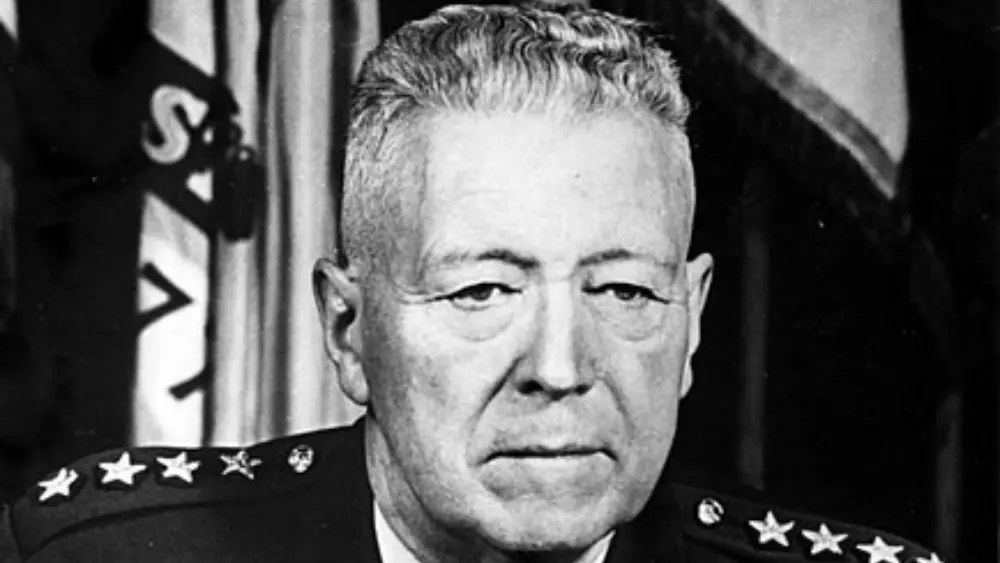Bruce C. Clarke, a distinguished American military officer, made a lasting impact on military history through his exemplary leadership and acts of valor on the battlefield. Born on April 29, 1901, in Tennessee, Clarke defined his life and military career with his unwavering commitment to duty, leadership acumen, and courageous actions in the face of adversity.
Early Years and Military Education
Bruce C. Clarke’s early years and military education laid the foundation for a career marked by a deep sense of duty and dedication to the principles of military service. Born on April 29, 1901, in Tennessee, Clarke’s upbringing was characterized by the values of discipline and service instilled in him by his family. His journey in the military began when he entered the United States Military Academy at West Point, where he received a rigorous education in military tactics, strategy, and leadership. Graduating in 1925, Clarke was commissioned as a second lieutenant, setting the stage for a distinguished career in the United States Army.
Clarke’s military education at West Point equipped him with the skills and knowledge necessary to navigate the complex challenges of a military career. The principles of duty, honor, and country, deeply ingrained during his formative years, became guiding principles throughout his service. The early experiences and education that shaped Clarke’s military foundation laid the groundwork for his subsequent accomplishments and leadership roles within the U.S. Army, showcasing a commitment to excellence and a profound understanding of the responsibilities inherent in military service.
Bruce C. Clarke: World War II Service and Distinguished Leadership
During World War II, Bruce C. Clarke’s distinguished leadership became evident as he served in key staff and command positions, showcasing his strategic acumen and dedication to the Allied cause. Clarke played a crucial role in the European Theater, where his exceptional organizational skills and keen understanding of military strategy contributed to the success of various campaigns. Notably, he served as the Chief of Staff of the XII Corps, participating in critical engagements such as the Battle of the Bulge, one of the largest and most significant battles on the Western Front. His ability to effectively coordinate and lead troops in complex and challenging situations earned him respect and recognition among his peers and superiors.
Clarke’s contributions during World War II extended beyond the battlefield. As a military leader, he demonstrated a commitment to the welfare of his troops and the success of the overall mission. His strategic thinking and inspirational leadership style played a crucial role in the Allied victory, solidifying his reputation as a distinguished military officer and setting the stage for further accomplishments in his career.
Post-World War II Assignments and Cold War Challenges
Bruce C. Clarke’s post-World War II assignments demonstrated his adaptability and commitment to addressing the challenges of the emerging Cold War. In the years following the conflict, Clarke was assigned to key positions that reflected the shifting dynamics of global security. Notably, he served in Germany during the early stages of the Cold War, a period marked by heightened tensions between the United States and the Soviet Union. In this crucial assignment, Clarke played a vital role in maintaining a strong and vigilant American presence in Europe, contributing to the collective efforts of the Western allies to deter potential aggression.
The Cold War presented unique challenges, and Clarke’s leadership skills were instrumental in navigating the complexities of this geopolitical era. His ability to understand and respond to the strategic imperatives of the time showcased his commitment to preserving global security and stability. As the world grappled with the ideological and military standoff between the superpowers, Clarke’s assignments underscored the importance of skilled and adaptable leaders in navigating the ever-evolving landscape of international relations during the Cold War.
Bruce C. Clarke: Command of the 7th Army and NATO
One of the pinnacle moments of Bruce C. Clarke’s career was his command of the United States Seventh Army in the late 1950s. As the commander of the Seventh Army, Clarke demonstrated a steadfast commitment to military readiness, particularly in the face of the ongoing challenges posed by the Cold War. His leadership during this period was characterized by a strategic vision that emphasized preparedness and flexibility in response to the dynamic geopolitical landscape. Clarke’s tenure at the helm of the Seventh Army highlighted his ability to navigate the complexities of military operations during a time of heightened global tension.
In addition to his command of the Seventh Army, Bruce C. Clarke assumed the prestigious position of Supreme Allied Commander, Europe (SACEUR). Serving in this capacity within the North Atlantic Treaty Organization (NATO), Clarke played a crucial role in fostering the cohesion of NATO forces. His leadership at NATO was marked by a dedication to collective defense and the strategic coordination of allied military efforts. Clarke’s contributions to NATO reflected not only his commitment to the security of the United States but also his role as a key figure in the broader efforts to maintain peace and stability in the face of Cold War challenges.
Vietnam War and Advocacy for Military Preparedness
During the Vietnam War, Bruce C. Clarke continued to serve his country, bringing his wealth of experience and expertise to military planning efforts. Although not directly involved in combat operations in Vietnam, Clarke played a vital role in shaping the military’s strategic approach to the conflict. His leadership during this period was marked by a commitment to preparedness and a focus on maintaining a strong defense posture. Clarke’s understanding of the complexities of modern warfare, coupled with his advocacy for military readiness, underscored his belief in the importance of being well-prepared to deter potential adversaries and protect national interests.
Clarke’s advocacy for military preparedness during the Vietnam War was reflective of his broader commitment to ensuring the strength and readiness of the U.S. Armed Forces. In an era marked by shifting geopolitical dynamics and unconventional threats, Clarke’s leadership contributed to the development of military strategies that sought to address the challenges of the time. His dedication to maintaining a robust defense posture highlighted the crucial role of military preparedness in safeguarding national security interests during a period of significant global uncertainty.
Bruce C. Clarke: Retirement and Legacy
Bruce C. Clarke’s retirement from active duty did not mark the conclusion of his commitment to the military community. Even in retirement, Clarke remained a prominent figure, leaving a lasting legacy as a leader, mentor, and advocate for military professionalism. His years of service and leadership, spanning critical periods from World War II through the Cold War and the Vietnam War, contributed significantly to the evolution of the U.S. military.
Clarke’s legacy endures as he became a source of inspiration for subsequent generations of military officers. His dedication to preparedness, strategic thinking, and unwavering commitment to the principles of military service made a lasting impact on the U.S. Army. As a mentor, Clarke influenced the professional development of many officers who would go on to hold leadership positions in the military. His impact extended beyond his active service years, shaping the ethos of military professionalism and contributing to the ongoing refinement of the U.S. Armed Forces.
Awards and Recognitions
Throughout his illustrious career, Bruce C. Clarke earned numerous awards and recognitions, attesting to his exceptional leadership and valor in service to the nation and the United States Army. Prestigious decorations acknowledged Clarke’s achievements, highlighting his significant contributions across various theaters of operation. His commendations not only reflected personal merit but also recognized the impact of his leadership on the success of military campaigns during critical periods of American history.
Distinguished awards such as the Distinguished Service Cross, the Army Distinguished Service Medal, the Silver Star, and the Legion of Merit were among the honors bestowed upon Clarke. These accolades underscored his unwavering commitment to duty, strategic brilliance, and ability to inspire and lead troops in challenging circumstances. The array of awards and recognitions stands as a testament to Bruce C. Clarke’s exceptional service and the high regard in which his peers and superiors in the United States Army held him.

Bruce C. Clarke: Enduring Inspiration for Military Professionals
Bruce C. Clarke’s life inspires military professionals, embodying enduring values like leadership, dedication, and courage, serving as a profound source. Clarke’s distinguished career marked the U.S. Army, representing an unwavering commitment to duty, honor, and country. His adept navigation of a changing geopolitical landscape, coupled with a steadfast focus on military preparedness, sets a timeless example.
Clarke’s legacy resonates with military professionals, highlighting the profound impact exemplary leadership can have on freedom and democracy defense. Clarke’s leadership during World War II, the Cold War, and Vietnam imparts vital lessons on adaptability, strategy, and military strength. The enduring inspiration drawn from Bruce C. Clarke’s career extends beyond the historical narratives, influencing the ethos of military professionals who strive to uphold the highest standards of service and leadership in defense of the nation.










